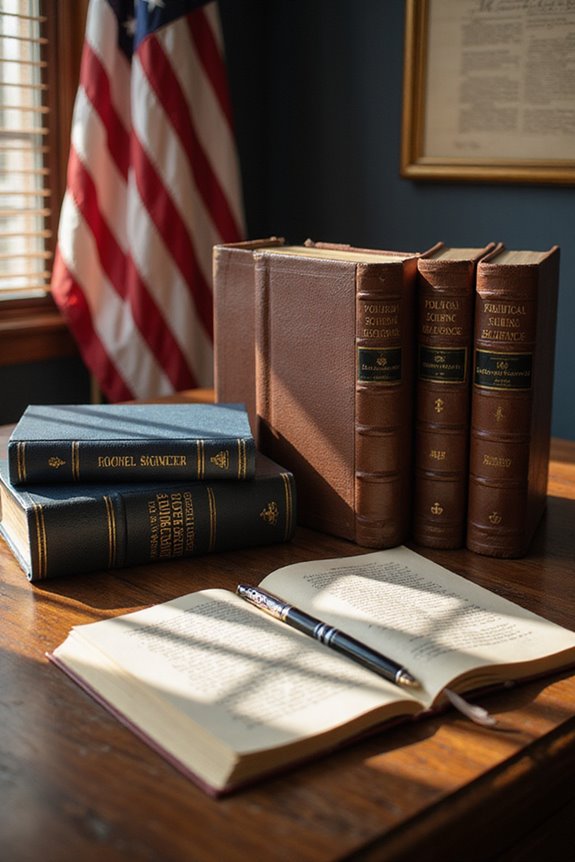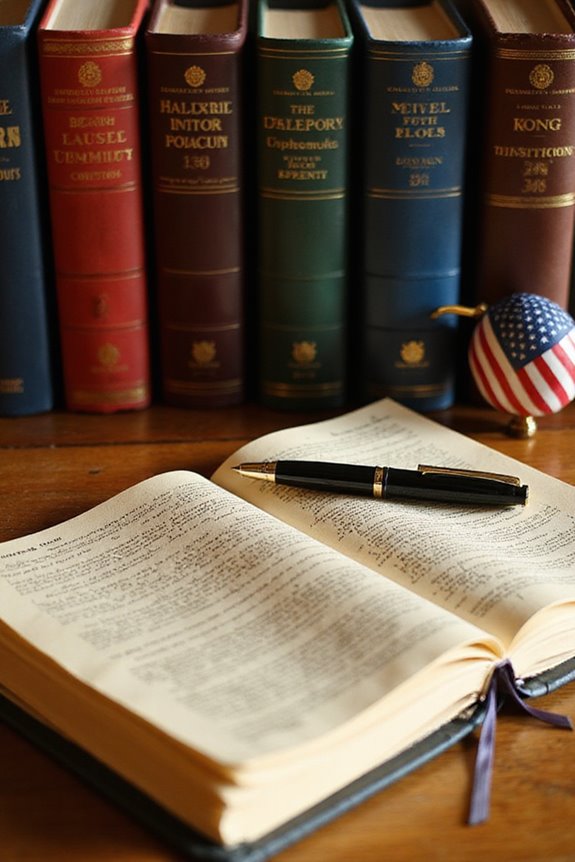For college students interested in political science, several key texts offer foundational understanding:
- Aristotle’s Politics explores governance types and citizenship.
- Plato’s Republic discusses justice in political order.
- Hobbes’s Leviathan presents the social contract theory.
- Locke’s Second Treatise emphasizes natural rights and consent.
- Rawls’s Justice focuses on fairness within pluralistic societies.
These texts help us grasp complex political theories. As we analyze contemporary issues and social movements, further insights await us.
Key Takeaways
- Foundational texts like Aristotle’s *Politics* and Plato’s *Republic* provide essential insights into political theory and governance.
- OER resources, such as OpenStax and the Open Textbook Library, offer cost-effective and customizable political science materials for college courses.
- Recommended texts like *Magruder’s American Government* and *The Basics of American Government* cover key concepts in American politics and government structure.
- Incorporating experiential programs enhances understanding of civic responsibility and encourages active participation in the political process.
- Mixed methods research approaches, combining qualitative and quantitative techniques, are vital for comprehensive political science studies.
Foundational Texts in Political Philosophy
When we explore foundational texts in political philosophy, we uncover the essential ideas that shape our understanding of governance and justice. Key works include:
- Aristotle’s Politics: Discusses virtue, citizenship, and government types.
- Plato’s Republic: Explores justice and the ideal political order.
- Augustine’s City: Integrates religious views on earthly and divine governance.
- Aquinas’s Law: Develops natural law theory linking divine and human law.
- Machiavelli’s Prince: Examines realpolitik and pragmatic governance.
- Hobbes’s Leviathan: Defines the social contract for order.
- Locke’s Rights: Emphasizes natural rights and government by consent.
- Montesquieu’s Spirit: Introduces separation of powers.
- Rousseau’s Social: Advocates for popular sovereignty.
- Marx’s Critique: Challenges capitalism and class dynamics.
- Mill’s Liberty: Focuses on individual freedoms.
- Tocqueville’s Democracy: Analyzes democratic systems.
- Nietzsche’s Morality: Questions modern ethical frameworks.
- Rawls’s Justice: Proposes fairness in pluralistic societies. Additionally, modern texts such as Steven Barracca’s work provide an accessible introduction to western political thought that is crucial for college students. These foundational texts help students understand the evolution of political thought and its impact on today’s governance systems.
Social and Economic Perspectives on Governance

Social and economic perspectives on governance are essential for understanding how political and economic systems interact in shaping societies.
- We see that social governance influences economic policies by reflecting cultural values and institutional frameworks.
- Political forces often dictate economic policies, impacting voter behavior and interest group dynamics.
- Economic conditions can shape political fortunes, affecting how policies are enacted and received. Political pressures often hinder the implementation of optimal economic policies, which can lead to suboptimal outcomes for both governance and the economy.
- The interplay between social dynamics and economic policies is vital for achieving stability and equity. Historical context of liberalism reveals how past decisions can inform current governance strategies.
- Addressing economic inequality through effective governance can enhance political stability and improve policy outcomes.
- By studying these interactions, we gain insights into promoting a “good economy in a good society,” especially in times of crisis.
Understanding these perspectives enriches our analysis of governance and its societal impacts.
Research Methods and Methodology in Political Science

In exploring research methods and methodology in political science, we recognize the importance of rigorous approaches to studying political phenomena.
- Quantitative Methodology:
- Integrates statistical analysis to identify trends.
- Utilizes surveys and experiments for research design.
- Employs R software for hypothesis testing.
- Focuses on sampling techniques for data representativeness.
- Uses multivariate analysis, such as logistic regression, for complex data sets. Statistical analysis is crucial for interpreting the results of quantitative research effectively.
- Qualitative Techniques:
- Involves case studies for in-depth insights.
- Relies on interviews and focus groups for richer data.
- Analyzes texts through content analysis.
- Adopts mixed methods to combine strengths of both approaches. The inclusion of mixed methods design allows researchers to leverage both qualitative and quantitative strategies for a more comprehensive analysis.
Understanding these methodologies enhances our ability to analyze political issues effectively and accurately.
Contemporary Issues in Democracy and Governance

Contemporary issues in democracy and governance present significant challenges that require our attention and action.
- Democratic erosion is evident through increased corruption and weakened institutional checks.
- Many citizens feel excluded from meaningful political participation, leading to disillusionment and low trust in government.
- Over 50% of surveyed individuals report feeling distanced from the political process, fostering an environment ripe for populism.
- To counter these trends, we must prioritize citizen engagement and inclusivity in decision-making. The insights from *Prisoners of Geography* highlight how geographical constraints can shape political decisions and affect citizen involvement.
- Broad coalitions of pro-democracy actors are essential for resisting authoritarian influences and ensuring electoral integrity.
- By enhancing transparency and reinforcing the rule of law, we can combat corruption and build public trust.
- Ultimately, rejuvenating democracy necessitates placing citizen voices at the forefront of governance.
Global Perspectives on International Relations

Global perspectives on international relations are crucial for understanding the complexities of global politics today. By examining international relations through various lenses, we can better comprehend issues like global governance and regional perspectives.
Key literature in this area includes:
- Global Perspectives: International Relations, U.S. Foreign Policy, and the View from Abroad: This book offers insights from global leaders, enhancing our understanding of U.S. actions.
- International Relations: An Introduction: It presents theories and debates, emphasizing both Australian and broader global viewpoints.
- Perspectives on International Relations: This work analyzes terrorism and global governance, using frameworks like realism and liberalism.
Incorporating diverse regional perspectives enriches our understanding of geopolitical dynamics and contemporary global challenges, making these texts crucial for any political science curriculum. Additionally, the importance of cooperation among nations is emphasized throughout these works, highlighting the need for collaborative approaches to address global issues.
Notable Works on Political Power and Strategy
Understanding political power and strategy is essential for grasping how decisions are made in governance and international relations. Several notable works shape our understanding of power dynamics and strategic influence in politics:
- *The Prince* by Niccolò Machiavelli outlines pragmatic strategies for acquiring and maintaining power.
- Thomas Hobbes’ Leviathan emphasizes the need for absolute sovereignty to prevent chaos from self-interest.
- John Locke’s Second Treatise of Government discusses the protection of natural rights within a framework of limited political power.
- Bruce C. Wolpe’s The Committee provides insights into coalition-building and legislative influence in Congress. Additionally, these texts prompt readers to consider the impact of institutional influences on the evolution of political strategies and power dynamics.
- These foundational texts collectively illustrate the complex relationship between authority, legitimacy, and the strategic use of power in political contexts. Furthermore, understanding the appeal of power-hungry personalities is crucial for analyzing why certain individuals rise to leadership roles despite potential ethical concerns.
Analysis of Class Struggle and Economic Disparities
Class struggle and economic disparities represent critical dynamics that shape societal structures and political landscapes. We see class disparities arising from economic power imbalances, where the bourgeoisie controls production means while the proletariat relies on wages. This tension leads to direct and indirect forms of conflict, including strikes and political disenfranchisement.
- Karl Marx emphasized class struggle as a catalyst for change, highlighting the ongoing conflict between social classes. Class struggle is also seen as central to Marx’s theory of history and social evolution, illustrating its profound impact on societal development.
- Economic coercion manifests through labor disputes and threats to job security.
- Political tactics often suppress working-class interests, maintaining the status quo.
Understanding these dynamics is essential for analyzing how economic power influences political relations and societal norms, ultimately affecting individuals’ lives and opportunities for advancement.
Essential Readings on Political Change and Social Movements
Essential readings on political change and social movements provide us with valuable insights into the mechanisms driving societal transformation. These texts explore how grassroots activism fosters civic engagement, shaping our collective future.
- Historical Context: Movements like the Arab Spring exemplify the power of social movements in democratization.
- Activist Shift: In countries like Poland and South Africa, activists have shifted into political elites, influencing state policies. This transition highlights how identities and networks from prior struggles can impact minor issues in governance.
- Digital Influence: Technology revolutionizes activism, enabling rapid mobilization and information sharing, as seen in contemporary movements.
- Comparative Analysis: Studies of various movements reveal critical factors such as political opportunities and mobilizing structures that differ by region.
Together, these readings deepen our understanding of how social movements drive political change and influence governance globally.
Open Educational Resources for Political Science Students
Open Educational Resources (OER) represent a transformative approach to learning in political science, offering us a wealth of free materials that enhance both teaching and study. These resources foster educational equity by ensuring all students have access to high-quality content without financial barriers.
Key benefits of OER include:
- Cost Savings: Noticeably lower textbook expenses for students.
- Customization: Faculty can adapt resources to meet specific course objectives.
- Diverse Materials: Options like OpenStax and the Open Textbook Library provide a variety of textbooks and research materials.
- Open Access: OER allows easy sharing and collaboration, promoting a community of learners. Additionally, OER promote sharing and collaboration among educators and students, which is essential for fostering innovation in educational practices.
Recommended Texts for Understanding American Government
Understanding American government is essential for students maneuvering the complexities of political systems and civic engagement. Here are some recommended texts that effectively combine modern textbooks with interactive learning:
- Magruder’s American Government: A thorough textbook covering the Constitution and foreign policy, priced around $85.
- Government Alive: This offers interactive approaches through hands-on activities and simulations, enhancing student engagement.
- The Basics of American Government: A peer-reviewed textbook priced at $27.99, featuring original case studies and civic engagement exercises.
- The American Political Economy: Provides a cross-national perspective, suitable for advanced students seeking in-depth analysis.
These resources help foster a nuanced understanding of American government and encourage active participation in civic life. Incorporating engaging experiential programs into the curriculum can further enhance students’ learning experiences and understanding of civic responsibility.
Frequently Asked Questions
What Are the Best Introductory Books for Political Science Students?
When exploring the best introductory textbooks for political science, we recommend essential readings like OpenStax Introduction to Political Science and American Government 2E, as they provide foundational knowledge and engaging insights into political systems.
How Do I Choose a Political Science Research Topic?
When choosing a political science research topic, we should consider that 70% of students struggle with topic selection. By focusing on relevant issues and appropriate research methodology, we can create compelling, insightful projects that resonate.
What Skills Are Essential for Studying Political Science Effectively?
To study political science effectively, we need strong critical thinking and analytical writing skills. They help us dissect complex ideas and articulate our thoughts clearly, ensuring our arguments resonate well with diverse audiences.
Are There Any Influential Women Authors in Political Science?
Absolutely, there’re numerous influential women authors in political science. They’ve shaped feminist theory and political activism, like Carole Pateman and Susan Faludi, whose insights challenge traditional perspectives and inspire new discussions in the field.
How Can I Apply Political Theories to Real-World Situations?
We might think political theories are too abstract, but their application to real-world situations reveals essential insights. By understanding theory application, we can better navigate the implications of power, cooperation, and governance in our daily lives.







